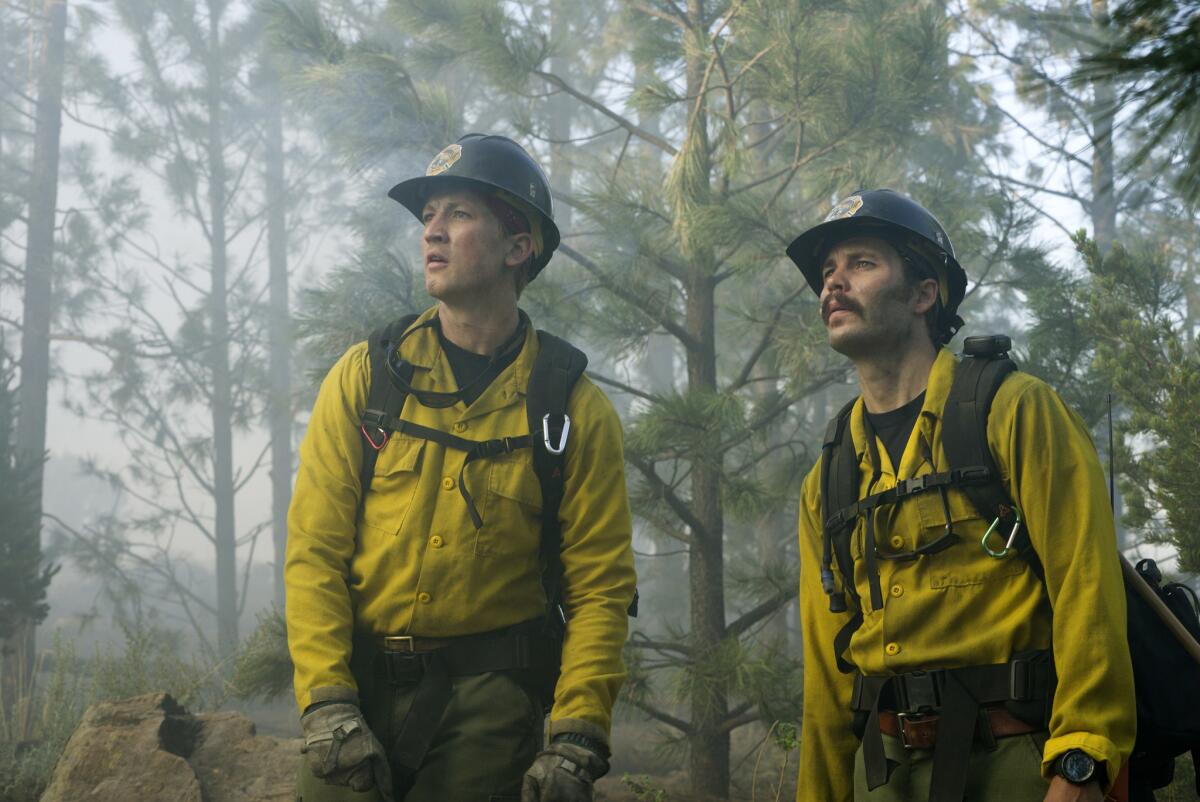Miles Teller takes on real-life unsung heroes in ‘Only the Brave’ and ‘Thank You for Your Service’

For any actor, playing a real, living person carries its own special weight. That goes double when you’re chronicling the most traumatic moments in that person’s life.
“If you take pride in what you do, you always have a bar you’re trying to hit,” Miles Teller said on a recent afternoon in Beverly Hills. “But playing a real person, there’s an extra obligation.”
Teller has been feeling that obligation a lot lately.
As it happens, this month the actor, who has starred in such films as “Rabbit Hole,” “The Spectacular Now” and “Whiplash,” portrays two real-life unsung heroes who persevere through trying ordeals in a pair of high-profile movies opening one week apart.
In the action drama “Only the Brave,” in theaters Oct. 20, Teller stars as Brendan McDonough, a heroin addict who received a shot at redemption when he joined an elite Arizona wild-land firefighting crew called the Granite Mountain Hotshots, only to become the lone survivor of one of the deadliest firefighting disasters in American history.
In the emotionally wrenching “Thank You for Your Service,” opening Oct. 27, he plays Iraq War veteran Sgt. Adam Schumann, exploring how he and a handful of fellow soldiers struggle with post-traumatic stress disorder and the difficult readjustment to civilian life after returning home from combat.
Teller, who is 30, has played fictional heroes before — perhaps most notably as the shape-shifting Reed Richards in the ill-fated 2015 superhero movie “Fantastic Four,” an experience that left him feeling bruised. (“It’s funny when people want to blame the actor for a movie being bad — that’s not how it goes.”) Stepping into the shoes of McDonough and Schumann, though, has given him a deeper kind of fulfillment. “It seeps into your skin a bit more,” Teller said.
That Teller himself has a somewhat cocky, swaggering public image that he feels detached from — and at times misrepresented by — may give him some additional empathy in handling someone else’s story. “Nobody knows how to be famous, man,” he said. “I know how to be myself — and even that is getting warped because you become so self-aware and you’re dealing with all this [stuff] you’ve never had to deal with. I mean, everybody knows you’ve got to have thick skin to be in show business. But it can get to you.”
Elevating the kinds of working-class everymen who don’t typically claim the spotlight, both “Only the Brave” and “Thank You for Your Service” seem likely to strike a particular chord in what Hollywood often broadly considers flyover country. And for Teller — who also played real-life boxing champ Vinny Pazienza in last year’s well-reviewed but largely overlooked drama “Bleed for This” — that was part of the appeal.
“I absolutely want to step outside my bubble,” said the actor, who grew up largely in a heavily military-recruited town in Florida. “I like making movies about blue-collar guys. I don’t know if that’s more my upbringing, but I want to tell their stories. As far as who wants to see it? Look, we just had an election where the white middle class and lower middle class felt forgotten about, and that kind of swung the election for Trump.” He shrugged. “But I don’t know. I sign up for the experience first and then the movie comes later.”
Speaking to The Times in early October, as raging wildfires were beginning to spread devastation across Northern California, Teller said he hadn’t known much about how such fires were fought before signing on to “Only the Brave.”
“I thought planes fly overhead and they drop the slushie and the water and that takes care of it,” said Teller, who underwent a grueling wild-land firefighting boot camp along with his co-stars, including Josh Brolin and Taylor Kitsch. “But then you realize, no, it’s these dudes working 16 hours a day. It’s just grit and toughness. Usually they’re gone before anyone can even thank them. First responders, man — they don’t make them better.”

In order to truly honor the Granite Mountain Hotshots, 19 of whom were killed in the 2013 Yarnell fire, director Joseph Kosinski felt it was crucial to depict them not as two-dimensional heroes but as fully fleshed-out human beings.
“The heart of this movie is: What makes these guys tick?” Kosinski said. “What makes up a man or a woman who runs toward the thing that everyone else is running away from? This story is about people more than fire. I felt like the best way to do it was to present everyone as they are. No one is perfect, and the more that you dive into that, the more real the characters become.”
McDonough, who chronicled the Yarnell fire tragedy in his book “My Lost Brothers,” didn’t shy away from letting Teller delve into the darker parts of his life.
“Once I read the script, I knew there were going to be some scenes that I wanted to talk to Miles about,” he said. “We talked in great depth about my addiction, becoming a father, becoming a Hotshot. Miles asked the right questions, and it was just very organic. He never had an agenda to press for something.”
For McDonough, the most important thing was to try to convey the courage and camaraderie of the men he’d worked alongside. “Miles really took the time to make sure he portrayed me in the way that brought honor to my brothers and how they changed my life,” he said.
Teller had initially approached “Thank You for Your Service,” which is adapted from journalist David Finkel’s 2013 book, with more hesitation. At first, he resisted the idea of playing a soldier with PTSD. It just didn’t feel like his place somehow.
“A lot of my really good buddies served in the military, and I think that’s a sacred fraternity,” he said. “The core of what we do as actors is pretend — we’re faking it. I was like, ‘That doesn’t feel right to me. I don’t want to act that.’ ”
In the end, though, Teller decided that the benefits of raising awareness of the struggles Schumann and other vets have faced far outweighed his own discomfort.
“I was like, ‘You know what? This is my responsibility,’ ” he said. “As a vet, you get home, they split you up from all your brothers who were there with you — and that’s it. Then it’s like, ‘OK, go get a job at Walmart. Here’s 30 pills from the VA.’ It’s [screwed] up.”
For his part, Schumann was initially wary of seeing his story brought to the big screen. “I didn’t sign over my life rights until about a week into filming,” he said. “I didn’t know how they were going to spin things. Yeah, there’s a script in front of you, but what happens when they start filming? Are they going to use my name and make me murder somebody? I mean, it’s a movie — you don’t know. But they really did an excellent job of welcoming me into the process and letting me be a part of it.”
At a time when virtually everything seems freighted with political resonance and both parties are trying to claim the mantles of patriotism and heroism, “Thank You for Your Service” is likely to viewed by many through that lens. (The right-leaning website Lifezette.com recently listed it as one of “12 Conservative Movies Coming to Theaters.”)
But writer-director Jason Hall — who wrote the 2014 blockbuster “American Sniper,” which itself became a political hot potato — says he doesn’t see it in those terms.
“I don’t find it overtly political, but I didn’t find ‘Sniper’ overtly political either and some people certainly did,” Hall said. “I just hope it strikes a chord of empathy with people and helps us take a step forward in understanding what these veterans have been through so we can find a better way to welcome them home.”
Teller has seen up close how cathartic it has been for Schumann and McDonough to tell their respective stories and how much it has helped others as well. With “Only the Brave,” he has spent time with the family members of the fallen Granite Mountain firefighters. With “Thank You for Your Service,” he has watched veterans hugging one another and crying after screenings.
“These two projects have felt so much bigger than all of us in terms of how it affects these people,” Teller said. “These movies will affect these people’s lives forever. If a movie can actually work as therapy, then dude, it’s so much more than a movie.”
Twitter: @joshrottenberg
More to Read
Only good movies
Get the Indie Focus newsletter, Mark Olsen's weekly guide to the world of cinema.
You may occasionally receive promotional content from the Los Angeles Times.











